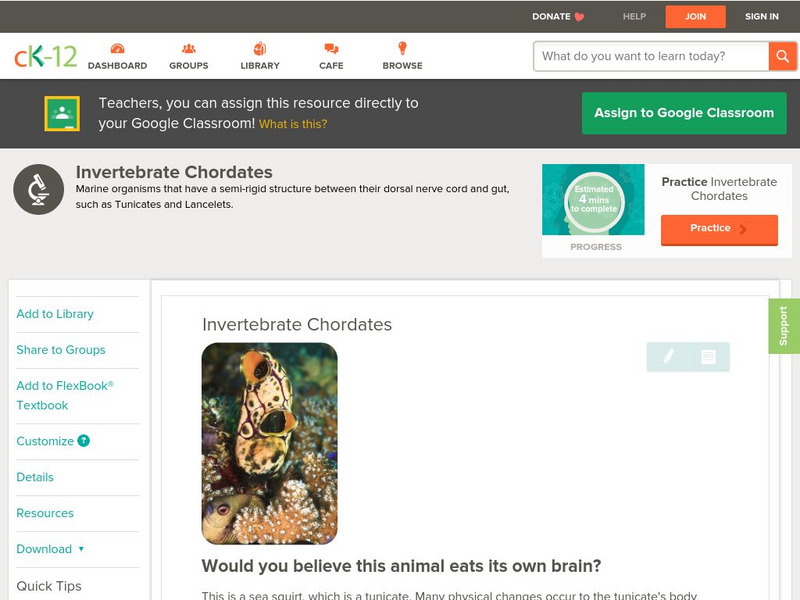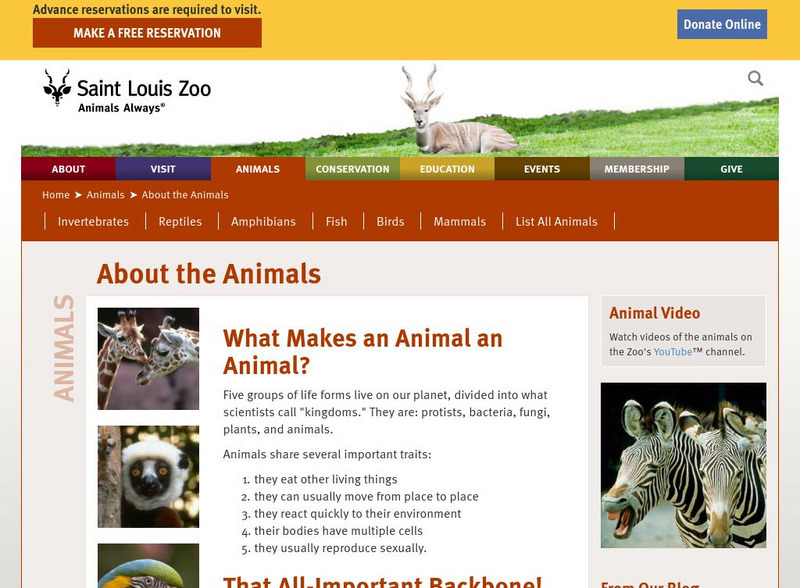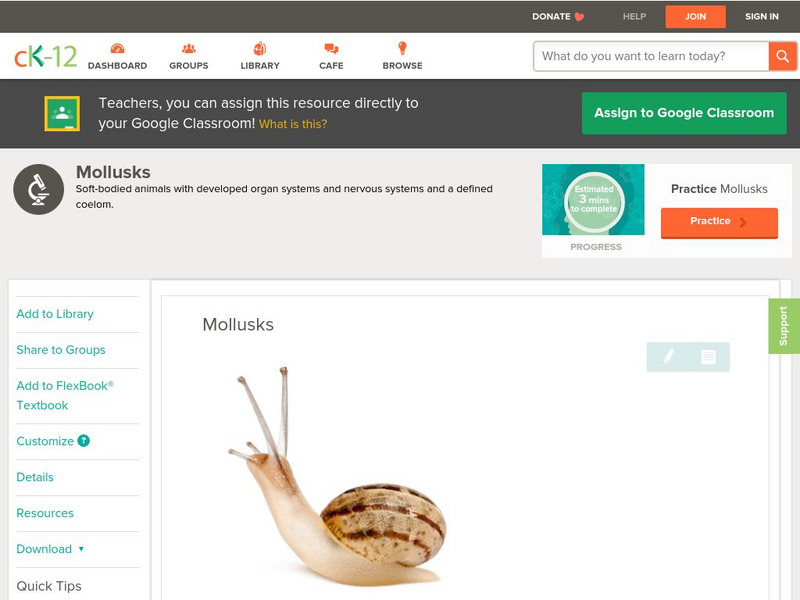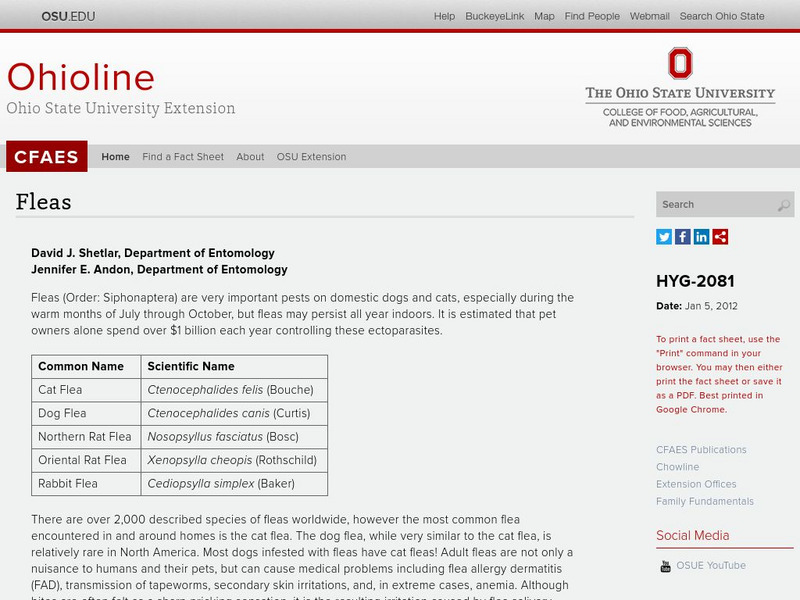Hi, what do you want to do?
Other
Denver Museum of Nature and Science: Follow a Fossil
Students examine paleontology, the study of ancient life on Earth. Some topics explored are vertebrates, invertebrates, and plants.
My Learning
My Learning: Minibeasts
All you need for an in-depth study of invertebrates is here on this site. Includes worksheets, quiz, useful information, and a fun interactive section where you can build your own super bug!
Georgia Department of Education
Ga Virtual Learning: Ap Biology: Animals
This unit focuses on the unique structure and function of both invertebrate and vertebrate animals. Students review their understanding of animal diversity, and take a closer look at the various organ systems found in the animal kingdom.
Smithsonian Institution
National Museum of Natural History: Ocean Planet: In Search of Giant Squid
An on-line exhibit archived from a Smithsonian exhibit explores and interprets the facts and myths surrounding giant squids - the world's largest invertebrates.
Other
Science4 Us: Animals
In online and offline activities, students broaden their understanding of animals by learning to identify and classify animals into six categories: mammals, birds, fish, amphibians, reptiles, and invertebrates.
Songs for Teaching
No Backbone Beat
Learn your invertebrates with this great rap. Your students will be walking through the halls singing this rap, when you begin your invertebrate unit with it. It covers protozoan, metazoan, arthropods, and more.
CK-12 Foundation
Ck 12: Biology: Invertebrate Chordates
[Free Registration/Login may be required to access all resource tools.] Discusses the characteristics of the two major subphyla of chordates without a backbone.
Australian Broadcasting Corporation
Australian Broadcasting Corporation: News in Science: Sea Urchins Are Part Human
From ABC News in Science, this article discusses research connected to the possibility that despite their qualities of brainless, limbless, and invertebrates, sea urchins are actually similar to humans.
Australian National Botanic Gardens
Australian Government: Fungi and Invertebrates
You will explore the symbiotic relationship that exist between different fungi and a variety of insects in this interesting site.
Smithsonian Institution
Smithsonian National Zoo: Chambered Nautilus
As part of the Invertebrates exhibit at the National Zoo, this site highlights various facts and interesting information on Chambered Nautilus. Topics covered in the overview include Physical description, Life span, Predators,...
Yale University
Yale Peabody Museum
This home page describes what the museum has to offer. Links to the exhibits and more information is provided at the bottom of the site.
Enchanted Learning
Enchanted Learning: Giant Squid
What makes a giant squid unique? This site features a diagram and some information about this cephalopod. Students can learn about the giant squid's anatomy, diet and more through this resource.
Scholastic
Scholastic: Study Jams! Science: Animals: Arthropods
A slideshow and a short multiple-choice quiz on the group of invertebrates called arthropods, with examples of different kinds.
University of Oxford (UK)
Oxford University Museum of Natural History: The Learning Zone: Fossils
This excellent website walks students through the basics of understanding fossils. It emphasizes that most common fossils would be invertebrates and, after learning more about these life forms, students can choose to take a quiz. The...
NOAA
Noaa: Arctic Marine Animals
This slide show contains pictures of invertebrate arctic animals filmed during a 2005 expedition. Each photograph has a short description of the animal. There are ten animals displayed.
Curated OER
Invertebrates
Biology site provides information on the two basic groups of higher animals as well as a list of what makes invertebrates different.
Science Education Resource Center at Carleton College
Serc: Investigating Macroinvertebrates: How Clean Is Our Lake?
In this outdoor field study, students will collect and identify as many types of macro invertebrates that they find in Lake Bemidji using an identification key. Additionally students will create investigable questions regarding the macro...
Science Education Resource Center at Carleton College
Serc: Mn Step: Water Retention No Problem With the Key Investigation
Students go outside to a nearby pond or wet area, and collect vertebrates and invertebrates. These are identified using a classification key. Information is recorded using a digital camera and a science notebook. Students later prepare a...
Saint Louis Zoo
Saint Louis Zoo: About the Animals: What Makes an Animal an Animal?
Short introduction to animals explains the important traits that all animals share and the differences between vertebrates and invertebrates.
Environmental Education for Kids
Eek!: Environmental Education for Kids
This site provides illustrations, descriptions, and species of amphibians, birds, fish, insects, invertebrates, mammals, reptiles, and endangered species.
CK-12 Foundation
Ck 12: Life Science: Mollusks
[Free Registration/Login may be required to access all resource tools.] Mollusks are invertebrates that usually have a hard shell, a mantle, and a radula. Learn more about mollusks in this learning module produced by CK-12.
Smithsonian Institution
Smithsonian National Zoo: Cnidarians
As part of the Invertebrates exhibit at the National Zoo, this site highlights various facts and interesting information on Cnidarians. Topics covered in the overview include Habitat, Getting Physical, One Way Street, and Simple Plan.
Other
The Cephalopod Page: What Behavior Can We Expect of Octopuses?
The navigation and spatial skills, tool use, play, and personalities of octopuses are covered in the studies discussed in this article.
Ohio State University
Osu: Flea Fact Sheet
A fact sheet on fleas from the Ohio State University Extension lists scientific names, identifying characteristics, and pictures.
Other popular searches
- Invertebrates and Vertebrates
- Marine Invertebrates
- Invertebrate Worksheets
- Invertebrates Vertebrates
- Vertebrates an Invertebrates
- Vertebrate and Invertebrates
- Benthic Invertebrates
- Invertebrates Research
- Invertebrates + Vertebrates
- Invertebrate Phylum
- Invertebrate Classification
- Invertebrate Sponge






















